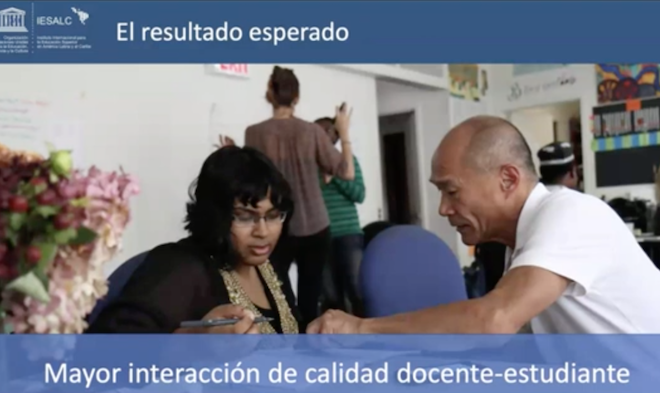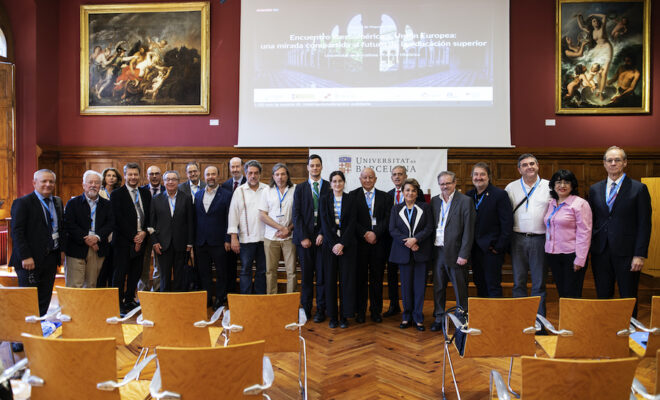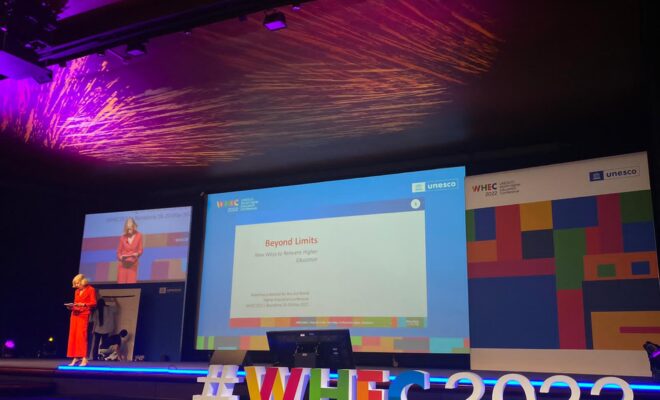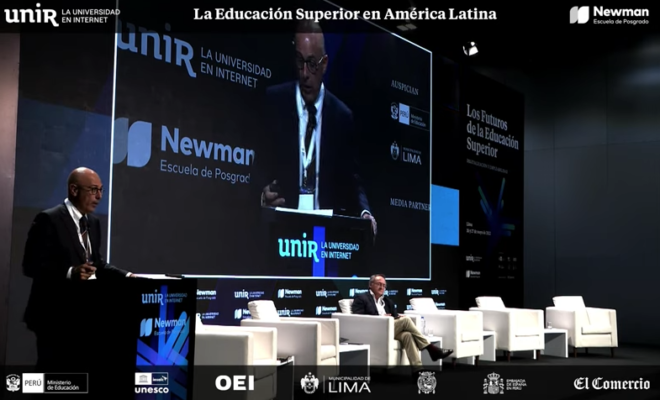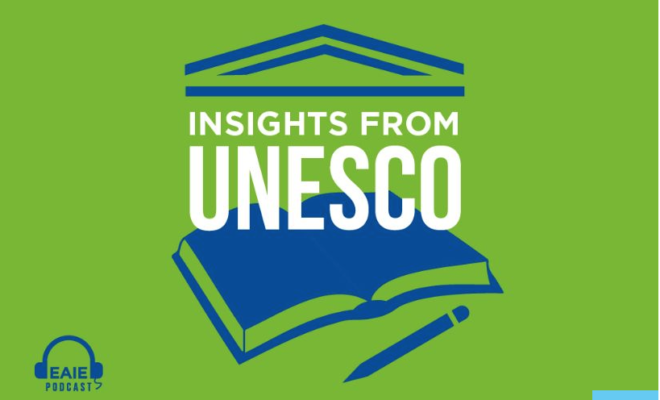Towards #WHEC 2022. Webinar 6: International cooperation to enhance synergies
One of the main axes of UNESCO’s World Conference on Higher Education #WHECS2022, to be held in Barcelona (Spain) next May, is international cooperation. In order to raise there the approaches of Latin America and the Caribbean, IESALC carries out a specific Regional Consultation, with a variety of events to bring together as many voices from different sectors as possible.
On this occasion, experts in the area participated in this online seminar – organized jointly with the IDB, the OEI, Santander Universities and the Ibero-American General Secretariat.
Some ideas from the speakers

Moderator: Victoria Galán-Muros, Head of Research and Analysis – UNESCO IESALC
International cooperation was defined as a key aspect of the knowledge globalization process at the first Regional Conference on Higher Education in Latin America and the Caribbean (CRES) in 1996. These regional conferences, themselves instruments for reformulating the process of international cooperation in higher education, have discussed the need, convenience and possibility of establishing a common tertiary education policy in Latin America and the Caribbean.
There, it has been suggested to move towards a cooperation that would overcome the asymmetries and differences between HEIs, through the consolidation of a multinational academic community and the creation of networks that would allow student and faculty mobility. Also important have been the calls for the allocation of funding for international cooperation, its institutionalization, starting with the creation of specialized management offices within each university and the call to governments to create favorable public policies.
The last CRES in 2018 included the SDGs, which functioned as a horizon that gave coherence to the various challenges involved in creating a space for international collaboration that would enhance synergies.
A horizontal relationship approach has been sought, allowing the transfer of knowledge and technology, a South-South cooperation that avoids the brain drain and contributes to the development of the region. Much progress has been made, there is no doubt, but the pandemic has made us rethink some of these actions and has made us see that there is still a long way to go for true regional integration anchored in a common space of knowledge and close international cooperation beyond the region.

Jocelyne Gacel-Ávila, General Coordinator and main researcher of the Regional Observatory on Internationalization and Networks in Tertiary Education in Latin America and the Caribbean of the University of Guadalajara (Mexico).
The integration of the different dimensions of the Sustainable Development Goals (SDGs) of the 2030 Agenda requires identifying and maximizing synergies between different stakeholders.
What is the role of international cooperation in achieving the SDGs? The biggest push for the SDGs is at the national level, but international cooperation plays a key role, maximizing synergies and enabling significant and catalytic investments.
Many developing countries require International Development Assistance to foster their growth. But Official Development Assistance (ODA) levels are declining. Donor countries have not contributed the established percentages. With Covid-19, an even sharper economic contraction is expected; aid may stagnate or decrease.
In North-South cooperation, i.e. aid from developed countries with resources to less favored nations, sometimes the issues are set by the North and the funding is of short duration. The South-South cooperation, being a partnership between equals, is born and designed by the interest and understanding of partners with similar development contexts, which creates a more horizontal relationship and the stakeholders are more involved in the processes. In triangular cooperation, two countries from the South and one from the North seek to maximize resources for promotion, horizontal cooperation, complementation, and synergies.
What is the role of cooperation in achieving the SDGs? We need explicit policies to channel cooperation activities and facilitate the implementation of results. Adjusted to each local context and articulated with national policies.
What is the role of universities? The fulfillment of the SDGs requires the involvement of governments, but their commitment alone will not be enough without the existence of mechanisms for their implementation. Universities are considered neutral actors and influencers, they are leaders, offer sources of expertise in SDG research and education, provide relevant evidence for decision making, and collaborate with other institutions at the international level.
Benefits of international collaboration in HE: they contribute significantly to the 2030 agenda because they bring added value. The SDGs are a useful and universally applicable general framework. There is a link between strategy and plans for international HE collaboration and the SDGs: networking, mutual learning opportunities, international visibility, offering international experiences to governments and communities, increasing expectations for future funding.

Dolly Montoya Castaño, president of UDUAL and President of the National University of Colombia.
Networks offer us constructive dialogues for reflection on lived experiences. With the cultural change brought about by the digital transformation, communications are strengthened and make it easier for us to establish close connections. The networks we need are those that are built with a long-term vision.
We at UDUAL have a robust network that is 72 years old, grouping 200 universities in 22 Latin American countries, where we have worked on the concept of university autonomy and worked for social development. Through networks we can bring knowledge to the region, which is what generates wealth and allows for a more egalitarian and equitable development.
There is no global pattern of development; each must have its own agenda. It is not about bringing knowledge from developed countries to countries in the South. It is how we share and not how we compete. Each one from its own development. Cooperation should be from equals to equals.

Sandra Regina Goulart Almeida, President of the Federal University of Minas Gerais
International cooperation has become a great instrument for the development of higher education, as it opens the academic space for the diversity of experiences of other subjects and cultures, offering a diverse and more qualified academic education.
I do not like the term international education. I prefer a broader concept that encompasses internationalization as a strategy of cooperation, a higher education open to international cooperation in teaching, mobility, joint research, etc.
For HE in the next decade, it is necessary to think about strategies. HE institutions should have institutionalized international cooperation programs in all areas of action, diversify North-South and South-South collaboration, work on language learning management, need for financial support to make international cooperation a more democratic process.

Paulo Falcon, former National Director of University Management (Argentina) and member of the Governing Board of UNESCO-IESALC
We must emphasize the role of internationalization from the perspective of cooperation. This forces us to think of ourselves in terms of integration, not exchange.
We have to see what the priorities are. Inclusion; LAC is the most unequal region and HE is experiencing this. Despite having full access, the most disadvantaged do not reach universities.
Another great challenge is quality assurance; how do we guarantee that the programs meet certain quality standards? In this respect, cooperation can do a lot, and we should be encouraged to think in terms of solidarity, of complementarity, not competition, where relationships are more real and effective.
The context of globalization leads us to the need to rethink substantive work, not only academic and research work. Undoubtedly, it is necessary to think of internationalization as a cross-cutting function in order to strengthen it and enable our communities to integrate effectively and take advantage of opportunities. This requires the adoption of governmental instruments and the ratification of the regional agreement for the recognition of studies.
Presentation
Cooperación internacional para mejorar sinergias (International cooperation to enhance sinergyes), Jocelyne Gacel-Ávila, General Coordinator and main researcher of the Regional Observatory on Internationalization and Networks in Tertiary Education in Latin America and the Caribbean of the University of Guadalajara (Mexico)
Learn more: Latin America and the Caribbean consultation addressed main themes of the #WHEC2022

RELATED ITEMS
